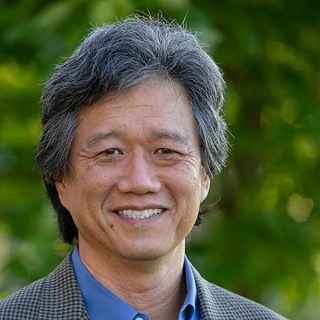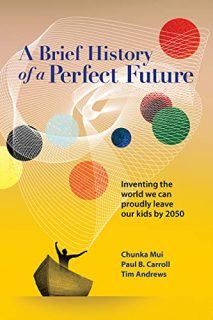What if, instead of trying to predict the future, we could just pick the one we want – and then invent it? A Brief History of a Perfect Future, is a book by Chunka Mui, Paul Carroll, and Tim Andrews. It describes seven stunning technological advances that will occur by 2050 and shows how to combine them, starting now, to build a future that will let billions thrive.
A futurist approach
Mui is a futurist and innovation advisor who helps design and stress test organizational missions and strategies aimed at making the world a much better place.

Chunka Mui
Now, he’s applying his experience and talents to an even more important topic: the future of their kids, and yours. In The Business of Health, Gisele Wertheim Aymes spoke to Chunka Mui.
Visualizing Improvement and Inventing The Perfect World
How can a person even visualize improvement over 30 years, let alone a series of them that will interact with each other in profound ways? The traditional approach has been to think in bite-sized increments, of perhaps three to five years, and to let the rest of the future take care of itself. The authors propose a different way.
“I think two things are going on. One is, human nature is very short term oriented. We are very low to give up something in the immediate future, in order address something that might or might not happen in the long term.”
What will the future world look like?

A Brief History of a Perfect Future
“It’s hard for us to crystallize what it means in the future for us today and that’s why in the book we really framed it around 2050, but not 2050 for ourselves but 2050 for our kids. In 2050 my daughter will be the same age I was when she was born. If you ask me about 2050 In the abstract it’s really hard for me to picture but I can picture her in 2050. I can picture the fact that she’ll be my age. I can picture the fact that she’ll probably have kids. That she has to survive in this world.”
Planning for a better future
The book paints visions of how the world could look if we all start planning now and experiment our way toward taking full advantage of the technological marvels that will be available. The authors provide what they call “future histories” — short, provocative articles set in 2050 that describe how key aspects of the world might look in areas such as transportation, health care, climate, and trust.
“The earth can sustain us if we act responsibly, and we take advantage of the marvels created by human creativity essentially. Because science and technology are the product of our creativity. We built these wonderful tools that can help us sustain the population we have now.”
Help invent a better future
The authors want to invent a perfect future. More precisely, they want to help you invent it.
“So if we as individuals recognise our personal stories in that long term and come back to today and decide. Well, I as an individual, if I’m going to buy another car, I should buy an electric car. I should look about whether I can ride my bicycle, I should look to see whether the next road my town wants to build has a bike lane. I can look to see if my daughters’ school has a place to park bikes. All these little discussions add up to a collective whole.”
Carbon emissions and future food
On the subject of global warming, Mui reminded us that cows account for another 4% of global carbon emissions in the form of methane through what scientists call eructation and flatulence, or what our kids refer to as burping and farting. They also contribute about half of the nitrous oxide released into the atmosphere as their feces decompose.
There’s hope yet! Scientists are studying ways to reduce methane production through genomics and selective breeding. What we eat can have a significant impact on climate change. There are also many companies working with future food. Developing artificial meat could also greatly reduce the size of cattle herds.

Photo by Benjamin Davies on Unsplash
The Laws of Zero
The authors do the million-fold imagining for the reader, describing seven so-incredible-as-to-be-almost-magical building blocks that will be available to all of us in 2050. These building blocks—in computing, communication, information, genomics, energy, water, and transportation—are following what the authors have dubbed the Laws of Zero.
“One thing about longevity to think about is, we want to think not only about medicine, but we also want to think about health and public health. There’s this old saying that plumbers in this world have saved a lot more lives than doctors.”
“Because things like sanitation and clean water are critical and that’s part of the infrastructure of our societies. So, the technologies we will have are all the way from water and sanitation and all those things will allow us to live better and stay healthy and live longer.”





![women [longevity live]](https://longevitylive.com/wp-content/uploads/2020/01/photo-of-women-walking-down-the-street-1116984-100x100.jpg)









